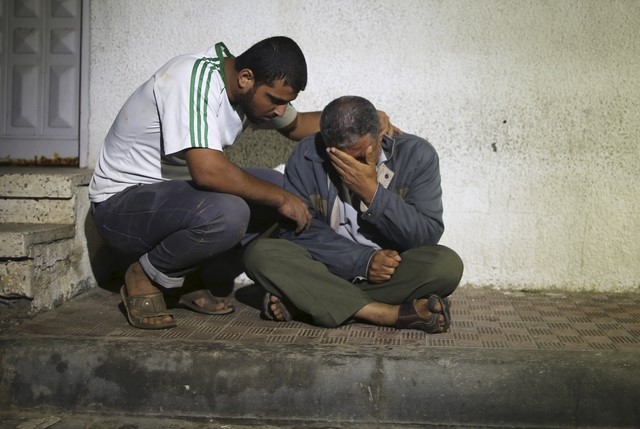By Nidal al-Mughrabi and Jeffrey Heller
GAZA/JERUSALEM (Reuters) - An Israeli air strike killed a Palestinian mother and daughter in the Gaza Strip on Sunday and police, confronting a surge of stabbing attacks in Israel, said they foiled an attempt to drive a car bomb into Jerusalem.
Palestinians disputed the police account, saying an electrical fire in the vehicle was mistaken for an explosion.
Four Israelis and 23 Palestinians have died in 12 days of bloodshed fuelled in part by Muslim anger over increasing Jewish access to the al-Aqsa mosque compound in Jerusalem. Violence has spread from the holy city and the Israeli-occupied West Bank to Israel's interior and Hamas-ruled Gaza.
With Prime Minister Benjamin Netanyahu cautioning Israelis there would be no "quick fix", there was no sign of any significant moves to turn away from conflict that has raised fears of a third Palestinian uprising.
Palestinian medical officials said 37 Palestinian protesters were wounded by live gunfire from Israeli troops during clashes on Sunday in the West Bank.
Responding to cross-border rocket attacks, Israel said its aircraft targeted a Hamas facility in the Gaza Strip. Palestinian medical officials said a pregnant woman and her three-year-old daughter living nearby were killed.
On a West Bank road leading to Jerusalem, police pulled over a car driven by a Palestinian woman who they said shouted "God is great" and detonated an explosive when an officer approached. The woman suffered burns to 40 percent of her body, Jerusalem's Hadassah hospital said, and the officer also was hurt.
Rafi Cohen, a police commander, described the vehicle as a car bomb and said "the woman terrorist who drove the vehicle intended to reach Jerusalem". An Israeli security source said gas canisters were found in the car.
A source in the Palestinian security services said there had been "a malfunction in her car, and there was no bombing". The source did not say how that information was gleaned.
Palestinians have so far not used bombs, a hallmark of their second uprising, from 2000 to 2005, in the current violence.
Against a backdrop of Muslim protests over Jewish visits to the al-Aqsa plaza, Islam's third holiest site and also revered by Jews as the site of biblical temples, Palestinians have been attacking Israelis with knives, rocks and, on at least one occasion, guns.
Palestinians regard the increasing trips over the past year by Jewish groups and right-wing lawmakers to the compound in Jerusalem's walled Old City as eroding traditional Muslim religious control there.
Israel has said it has no intention of allowing any change to the status quo under which Jews are allowed to visit the site but non-Muslim prayer is banned.
Tensions have also been stoked by Palestinian frustration over the failure to make progress - amid Israeli settlement-building in the West Bank - toward statehood in peace talks with Israel. Those negotiations collapsed in 2014.

Palestinians seek a state in the West Bank and Gaza with East Jerusalem -- which includes the Old City -- as their capital. Israel captured all three areas in the 1967 Middle East war. It withdrew soldiers and settlers from Gaza in 2005.